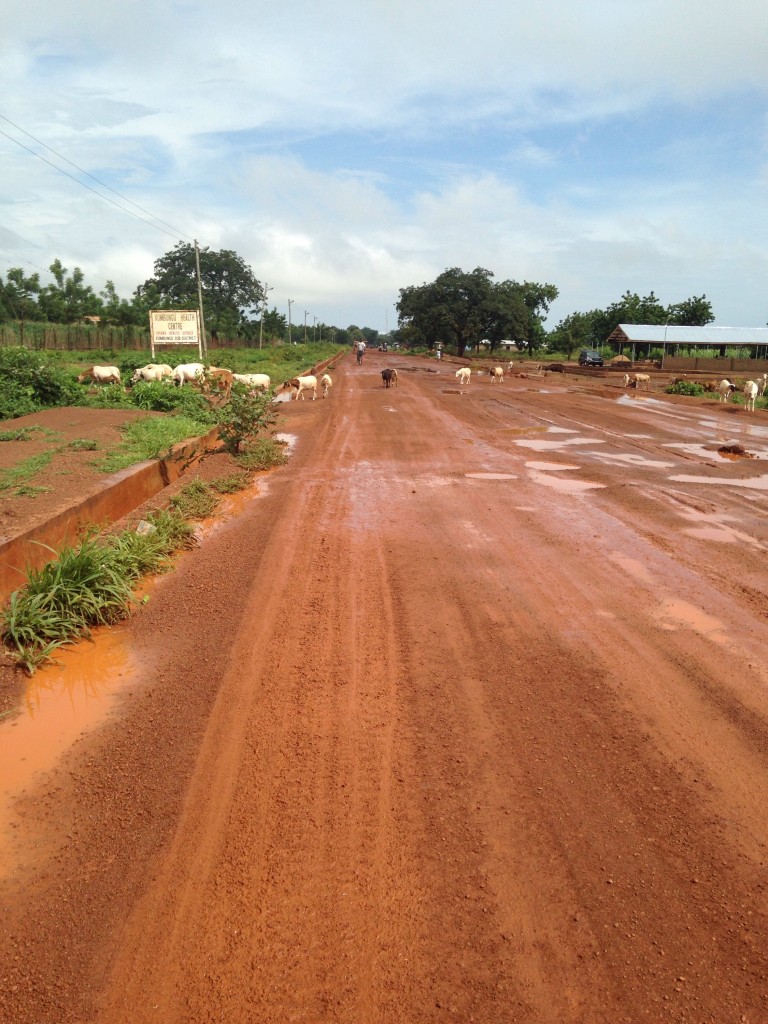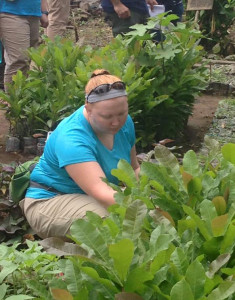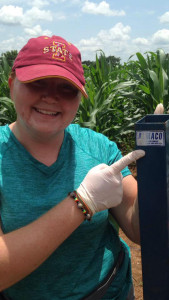I sat perched on a rock across from Elijah Gawaa, a middle aged Ghanaian farmer, as we chatted about his farm where he grew corn, soybeans, rice and peppers. “I know agric in America,” I started, “but I want you to help me know agric in Ghana”. Elijah’s face lit up as he nodded enthusiastically and I could tell I was in for an exciting afternoon.

I had met Elijah just the day prior walking from town back to the place that I have been staying just outside Kumbungu. He was hard at work reinforcing the fence around his maize field, but greeted me warmly as I walked by. “This is my farm!” he said proudly. I smiled and knew instantly that we were going to be friends. After a brief conversation I told Elijah that I would be teaching agric at the SHS in Kumbungu and that I would love to arrange another time to meet to learn more about his farm. He excitedly accepted and we made plans to meet the next day.
The midmorning rain left a heavy humidity in the air on this now sunny Sunday afternoon, but Elijah and I were comfortable in the shade of a tree next to his maize field. Armed with a 6 page survey to guide our conversation, I was excited to learn more about Ghanaian agriculture from the perspective of a Ghanaian farmer himself. Motorbikes whizzed by on the main road next to the field leading into Kumbungu and we were often interrupted by people greeting us in Dagbani. “Antire!” they would yell. Nodding and smiling we would respond “naa”. Sometimes people would even stop to chat and although the interruptions made conducting the survey take a lot longer, I didn’t mind the opportunity to practice my limited Dagbani vocabulary.
I learned a lot about Elijah and his farm during our nearly 2 hour conversation. He had so much pride in his 8 acre farm and was so animated when talking about it, that his passion was contagious. As I flipped to the final page of the survey a light rain had ensued. Packing up my things, Elijah led me around the corner of his field where a vacant house with a small porch stood. We sat on the porch and completed the duration of the survey.
As we waited for the rain to clear, I pulled out a book with pictures that a friend had made for me in anticipation of my travels to Ghana. Thumbing to the page with an aerial view of my parent’s farm, I handed the book to Elijah. “I have learned so much about your farm today. I want you to see my farm in America,” I said and I pointed out the maize and soybeans we had growing on either sides of the building site. I also explained to him our method of grain storage so that we do not have to sell all of our crop immediately after harvest. “Wow, wow, wow!” he said over and over again.

 As I watched him go through my pictures, it was easy to think about the differences in how we grew up and how we farm. Heck, just a glancing at our view from the small porch where we sat I could pick out at least a dozen differences in the agricultural production practices of northern Ghana compared to those of northern Iowa. But then I thought back to when I first met Elijah and how he exclaimed “this is my farm!”. I thought of the look in his eyes as he talked about his farm and the passion he conveyed in his animated gestures and words and I realized I had seen this passion before. I have seen this passion in my father, in my fellow agricultural colleagues at Iowa State and in nearly every American farmer I have encountered. The bottom line? We are not all that different.
As I watched him go through my pictures, it was easy to think about the differences in how we grew up and how we farm. Heck, just a glancing at our view from the small porch where we sat I could pick out at least a dozen differences in the agricultural production practices of northern Ghana compared to those of northern Iowa. But then I thought back to when I first met Elijah and how he exclaimed “this is my farm!”. I thought of the look in his eyes as he talked about his farm and the passion he conveyed in his animated gestures and words and I realized I had seen this passion before. I have seen this passion in my father, in my fellow agricultural colleagues at Iowa State and in nearly every American farmer I have encountered. The bottom line? We are not all that different.
Realizing this common ground that I had found with Elijah has also completely changed my mindset. Instead of entering a situation in a comparative way to identify the differences between myself and Ghanaians, I am finding that we have a lot more in common then I initially realized. Although school does not start for another week, I couldn’t be more excited to embark on the next chapter of this journey. It is ironic that I came to Ghana with the intention to teach, but I have a feeling that I will be the one doing the learning. I can’t wait to see what I learn from my students and the local farmers and what we can collectively do together to have a successful year.


